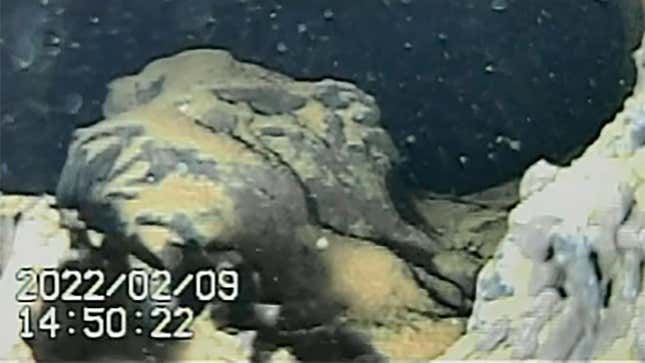
Images captured by a remotely operated probe appear to show mounds of melted nuclear fuel at the bottom of a Fukushima reactor core that experienced a meltdown 11 years ago.
The robot, deployed by the Tokyo Electric Power Company (TEPCO), gathered these eerie images last week, as the Associated Press reports. The apparent mounds of melted nuclear fuel were detected in reactor No. 1, one of three Fukushima reactors that experienced meltdowns after a devastating tsunami in 2011.
A TEPCO spokesperson told the AP that the piles were located at the bottom of containment vessels and also a structure directly beneath the core. The container is filled with cooling water, requiring a submersible robot. That these mounds are globs of melted fuel seems plausible, but the spokesperson said future probing will be required to make sure.

The meltdowns of the three reactor cores happened in the wake of a huge earthquake and tsunami, the latter of which damaged cooling systems at the nuclear plant. Highly radioactive fuel reached the bottom of containment vessels and remains there to this day. As AP reports, some 900 tons of melted nuclear fuel is believed to exist inside the damaged reactors, including 280 tons in reactor No. 1.
Removing this waste won’t be easy. TEPCO hopes to clean it all up by the 2050s or the 2060s, but the lack of a coherent plan and a solid strategy for removing the material makes this prediction an empty promise at best. Compounding this issue is the question of what to do with the copious amounts of radioactive water that’s preventing the damaged cores from melting further. Japan seems content to dump this wastewater back into the ocean, despite complaints.
Before TEPCO can go about the business of removing the melted fuel, however, it needs to know where the toxic stuff is located within the plant. A sleuthing robot was sent into reactor No. 2 in 2017, but it had difficulty navigating through the damaged plant and it eventually succumbed to the intense radiation inside. Another robot sent in 2017 managed to capture images of suspected melted nuclear fuel in reactor No. 3. In 2019, a robot picked up several grains of radioactive debris inside reactor No. 2, demonstrating it’s possible to remotely move some melted fuel.
On Tuesday, February 8, TEPCO once again deployed a remotely controlled robot, but this time in reactor No. 1, AP reports. The robot, equipped with cameras, ventured inside to places unseen for over a decade, which it did to chart out a path for future probes. In addition to the mounds, the bot managed to capture images of submerged structures, pipes, and various debris. The cooling water in reactor No. 1 is 6.5 feet (2 meters) deep in some places, according to the AP.
TEPCO says the data collected from the probe will be used to measure the amount of melted fuel in the mounds, build 3D maps of the interior, analyze isotopes, and collect samples. This data will in turn inform future clean-up efforts such that the plant can finally be decommissioned. Several other robots are expected to do more exploring in the coming months and even remove some samples of melted fuel.
The horror show that is the Fukushima nuclear disaster continues, though to be fair, only tiny amounts of radiation are currently leaking into the sea and surrounding areas. This form of energy is certainly cleaner than the alternatives, but without adequate planning and protections, the potential for disaster is enormous.
More: Japan’s New Fukushima Plan: Dumping Radioactive Wastewater Into the Sea.